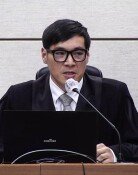Unprotected Foreign Workers Face Addiction
Unprotected Foreign Workers Face Addiction
Posted January. 14, 2005 22:50,
In addition to the Hwaseong, Gyeonggi fiasco, it has been discovered that a group of foreign laborers at LCD Components Company in the Ansan Banwol factory complex have shown symptoms of multiple neuropathy, a paralyzing disease of the limbs, and several have been receiving treatment for two years and seven months. The laborers have also been exposed to the Normal-Hexane constituents in detergents without face masks or any safety equipment during the final LCD components cleaning process. This recent occurrence shows that foreign workers employed in domestic small and mediumbusinesses are exposed to a harmful environment unprotected, and demand the strict supervision of authorities and immediate improvement of working environment for the companies involved.
According to the Korea University Medical Center, the subsequent victims up to January 14 are: 40-year-old Yang Cho-guk from the Ansan Banwol factory complex LCD component-assembling Company S (closed down), a 53-year-old woman named Yeo Su-woon, and a 47-year-old woman called Lim Ah-yan, among six other Chinese workers who caught the disease on June 2002.
After having developed partial paralysis of arms and legs, the workers had their nerve tissues checked in the hospital, and the results determined multiple neuropathy due to Normal-Hexane addiction.
Three of the workers, including Yang, were hospitalized at the center and Ansan Cheongang General Hospital since May 2003 and have been receiving rehabilitative treatment, receiving sporadic treatment even after being released with a recent relapse of health.
It has been known that Yang and the other workers handled cleaning fluids with Normal-Hexane compounds at the LCD monitor-producing S company for two to six month in a claustrophobic area.
Meanwhile, five Thai female workers, including 30-year-old Patariwan, who developed multiple neuropathy during employment at Company D in Hwaseong, are receiving rehab treatment at Ansan Cheongang General Hospital.
Our coverage team revealed that yet two more workers, one in 1999 at H Tires and one in 2002 at D Chemicals in Buchun, Gyeonggi, became addicted to the Normal-Hexane and were reported accordingly to the Korea Occupational Safety and Health Agency.
Director Kim Byung-gyu of Occupational Diseases Center at Korea Occupational Safety and Health Agency said, I believe that these people were Koreans, and they were cured completely when they received hospitalized treatment, and added, I do not know the reason why, but there are no reports of foreign workers or any requests for industrial investigation.
There are foreign workers who are in veritable jeopardy, such as the five female Thai workers at Company D in Hwaseong who were discovered to have fallen ill without any checkups, on January 14.
The Ministry of Labor responded, We are investigating whether the employer avoided the checkups to hide the fact of recruiting illegal workers, or if the employees themselves refused the checkups.
Gyeonggi Suwon Labor Office had its first investigation on company D on January 13 and is planning to execute regular health diagnosis, individual protection allotment, amongst others, to see whether health measures were not being adhered to, in which case the business representative will be persecuted.
The current administration laws states that workers who handle harmful substances (a total of 120 subjects) for businesses are entitled to health checkups once every six months to two years, according to the toxicity of the substance. However, violation of this law will only result in minimal fines of 200,000 won per person, illegal foreign workers not being included in the mandatory checkups.
Head of Occupational and Environmental Medicine at Korea University Medical Center Park Jong-tae pointed out, Industrial Safety and Health laws state that permanent staff are required to receive checkups for workplace diseases due to toxic substances, but temporary illegal foreigners are not checkup subjects and this kind of victimization are apt to recur.
Meanwhile, the Ministry of Labor has called back to Korea three workers, who were extradited to Thailand in December displaying such symptoms, to receive treatment.
A recent study from the Ministry of Labor revealed 367 businesses nationwide employing approximately 2,600 workers dealing with Normal-Hexane.
As of now, except for one worker, the multiple neuropathy Thai laborers are illegal foreigners as well as the Chinese workers.
Domestic laws, however, allow even illegal foreign workers affiliated with a workshop to receive Industrial Accident Compensation Insurance in case of occupational disasters and are permitted to stay in the country during the course of treatment.






![“설거지해도 그대로”…냄비 ‘무지개 얼룩’ 5분 해결법 [알쓸톡]](https://dimg.donga.com/c/138/175/90/1/wps/NEWS/IMAGE/2026/01/15/133164664.3.png)
